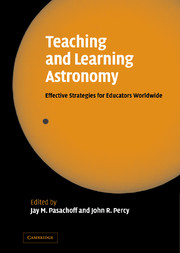Book contents
- Frontmatter
- Contents
- List of illustrations
- Preface
- Introduction
- Part I Astronomy in the curriculum around the world
- Part II Astronomy education research
- Part III Educating students
- Part IV Educating teachers
- Part V Astronomy and pseudoscience
- Part VI Astronomy and culture
- Part VII Astronomy in developing countries
- Part VIII Public outreach in astronomy
- Part IX The education programs of the International Astronomical Union
- Part X Conclusions
- Closing discussion
- Conclusion
- Author index
- Subject index
Conclusion
Published online by Cambridge University Press: 18 May 2010
- Frontmatter
- Contents
- List of illustrations
- Preface
- Introduction
- Part I Astronomy in the curriculum around the world
- Part II Astronomy education research
- Part III Educating students
- Part IV Educating teachers
- Part V Astronomy and pseudoscience
- Part VI Astronomy and culture
- Part VII Astronomy in developing countries
- Part VIII Public outreach in astronomy
- Part IX The education programs of the International Astronomical Union
- Part X Conclusions
- Closing discussion
- Conclusion
- Author index
- Subject index
Summary
What is the future of astronomy education worldwide? How can astronomers and astronomy educators ensure that the future will be a positive one? A few years ago, one of us was invited to write an article on the topic of the first question (Percy, 1996). The article also addressed the second question, but it ended as follows:
There are alternate futures, of course. Young people may reject astronomy and other sciences as uninteresting and irrelevant, and turn to pseudoscience and fantasy instead. Teachers, journalists, and other opinion-formers may be ignorant and afraid of science. College enrollments in astronomy may shrink as students flock to easy courses, or to courses that promise more than the tired lecture approach. Planetariums may subsist on laser shows; science centers may evolve into elaborate video games. Astronomy may become an esoteric career or hobby, practiced by an eccentric but privileged few.
Fortunately, many of the characteristics of this “alternate future” do not appear to be developing – yet. But there are negative developments. Belief in pseudosciences, such as astrology, creationism, and space aliens, is widespread, and is not decreasing, as both Jayant Narlikar, and John Percy and Jay Pasachoff, have explained. Astronomical misconceptions, of many kinds, continue to abound. Astronomy is poorly taught, if it is taught at all, in many schools. The scientific enterprise appears to be maintained by a small fraction of the population.
- Type
- Chapter
- Information
- Teaching and Learning AstronomyEffective Strategies for Educators Worldwide, pp. 260 - 263Publisher: Cambridge University PressPrint publication year: 2005



